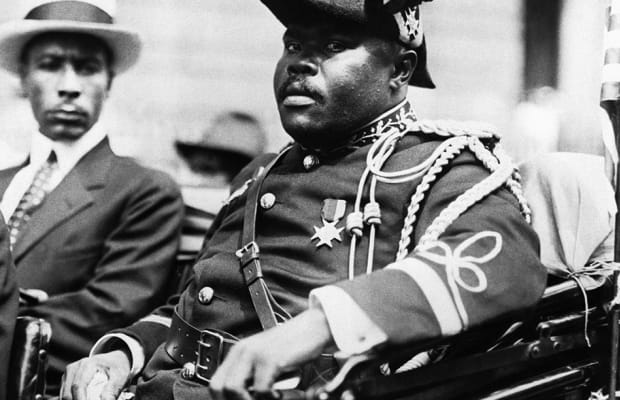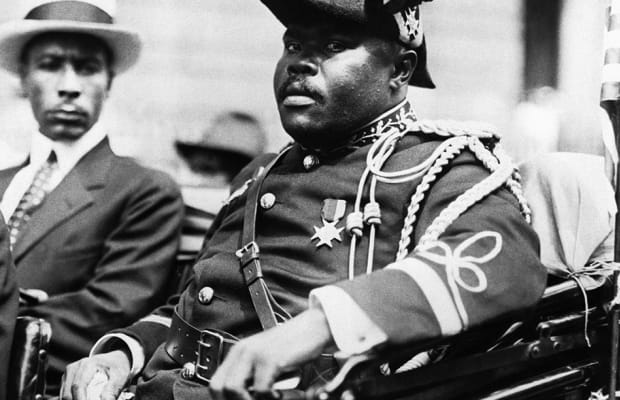In honor of the revolutionary’s birthday, race essayist Dr. Cynthia Alease was tasked with addressing his ideas, and her connection with them as an educator and Black woman. She doesn’t hold back, and we think Mr. Garvey wouldn’t have it any other way.

I can be described as not an ordinary anti-racism essayist and educator, which probably means absolutely nothing to people who don’t subscribe to the subjective meanings of terms such as ordinary and normal. However, by prefacing my essay about Marcus Garvey on the fact of my non-ordinary status, I am giving myself license to be different than those who celebrate Marcus Garvey totally and utterly. You see, I am somewhat ambivalent about him; his intent and interest in going back to a place he had never been, and his motivation for wanting to do so. Indeed, Marcus Garvey did not even set foot on the African continent he seemed to have fought so vehemently to get to.
It is not immediately clear what motivated Marcus Garvey to choose Black people in the United States in what was his first earnest fight for equality with or separation from white people, since he was not the offspring of the American Enslavement. Instead, he was born in Jamaica twenty-two years after enslavement ended for Black people in the U.S., and ten years after Reconstruction in the U.S. failed.
At age 29 in 1916, he first arrived on American shores, after corresponding for a time with Booker T. Washington, who was considered one of the major Black leaders and spokespersons from 1895 through his death in 1915. By the time of his arrival, however, Washington had been dead for about a year. It is said that Booker T. Washington’s writings had a dramatic effect on Marcus Garvey and may have been the catalyst, turning him into the pan African nationalist he became.
Marcus Garvey came to America and settled in New York, where in 1917, he established the Universal Negro Improvement Association. He married twice to women named Amy, one with whom he met at the Association and divorced in 1922, and the other, his personal assistant, he married the same year. As a public speaker, Garvey embarked on a 38-city tour, which commenced in New York City. By 1919, the membership in the Association had grown to approximately two million, and Marcus Garvey’s rhetoric began to take a turn in the direction of leaving the U.S. altogether rather than fighting for a freedom he decided would never happen unless Black people could establish their own, separate nation within America. In 1920, he wrote what became the “Declaration of Rights of the Negro Peoples of the World,” a manifesto or Constitution, whose preamble stated:
“Be It Resolved, That the Negro people of the world, through their chosen representatives in convention assembled in Liberty Hall, in the City of New York and United States of America, from August 1 to August 31, in the year of Our Lord one thousand nine hundred and twenty, protest against the wrongs and injustices they are suffering at the hands of their white brethren, and state what they deem their fair and just rights, as well as the treatment they propose to demand of all men in the future.”
At a convention of the Universal Negro Improvement Association, held at Madison Square Garden in that same year, the Declaration was ratified, and Marcus Garvey was elected as the “Provisional President” of Africa. This is where I take my first license toward ambivalence with regard to Marcus Garvey and his intent, since the African continent then as now, was not a country, but an entire continent with separate countries and municipalities, and the sheer audacity associated with allowing oneself to be elected president of an entire continent, to which no one on the continent had been allowed to choose him as president themselves, strikes me as grandiose with a heavy tinge of disingenuousness. Nevertheless, Garvey became successful for a time, opening the Black Star Line, with his first ship he rechristened, the “USS Frederick Douglas.” Garvey was adored by many Black people for his stance on Black freedom and equality and is credited with having been the one to coin the term, “Black is beautiful.” This turns my ambivalence on its ear, learning this only as of this writing.
It depends on which side of the freedom coin one sits in deciding on the impact Marcus Garvey had on American Black people and to white supremacy and Racism in America. Certainly, white supremacist racists like J. Edgar Hoover placed Garvey straight into his crosshairs the moment he discovered Garvey had apparently amassed a fortune large enough to start a shipping company, and two million members in his organization. It can be said that the movement by Elijah Muhammed had a root in the nationalism leanings of Marcus Garvey, and to some extent, the Black Panther party as well. Yet, people like W.E.B. Dubois, head of the N.A.A.C.P. at the time once stated, “Marcus Garvey is the most dangerous enemy of the Negro race in America and in the world.”
This is where my ambivalence is once more being given license, in evaluating the statement of Mr. Dubois about Marcus Garvey. What many may not realize is that the period in which Garvey and Dubois were operating is an era called the Nadir of Race Relations in America. The term, nadir literally means “the lowest point.” Therefore, Garvey was touring American cities with his brand of rhetoric during the same period that saw the Greenwood or Black Wall Street Massacre in May 31 and June 1, 1921, and the Rosewood Massacre during the first week of January 1923. The entire period from the end of Reconstruction in 1877 until the mid-20th century saw thousands of lynchings, and other state-sanctioned violent and deadly events befall Black people in America. Was Marcus Garvey an instigator? Was he considered an agitator? Was he somehow instrumental? There is no evidence, but to DuBois, whose rhetoric was about agitation and protest, it would seem they would have had more in common than Garvey would have had with Washington, whose rhetoric was about acceptance of segregation and discriminatory practices of white people while at the same time, elevating themselves economically, thus winning the respect of white people.

Where do I fall on my sword in defense of Mr. Garvey? Definitely not on his desire to have descendants of the Enslavement leave a country they built literally with the sweat and blood of their lives. But the dichotomy into which that small portion of ambivalence resides, and as an anti-racism activist and essayist who, but by the wisdom of people like Marcus Garvey and his beliefs and activism, go I, to him, I give thanks, for as he wrote:
“We must canonize our own saints, create our own martyrs, and elevate to positions of fame and honor black men and women who have made their distinct contributions to our racial history … I am the equal of any white man; I want you to feel the same way.”
And I believe like he did, that Black is Beautiful.
Sources:
https://www.notablebiographies.com/Fi-Gi/Garvey-Marcus.html
https://www.history.com/topics/black-history/marcus-garvey#section_2

